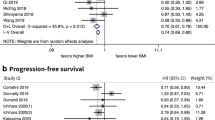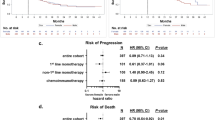Abstract
Background
We investigated the association of body mass index (BMI) modeled as a continuous variable with survival outcomes in advanced non-small cell lung cancer (NSCLC) patients treated with immune checkpoint inhibitors (ICI).
Methods
We performed a single-institution retrospective analysis of consecutively diagnosed locally advanced or metastatic NSCLC patients treated with single-agent ICI in the first line or recurrent setting. The primary outcome was overall survival (OS). Secondary outcomes were progression-free survival (PFS) and objective response rate (ORR). BMI was modeled using a four-knot restricted cubic spline. Multiple Cox regression was used for survival analysis.
Results
Two hundred patients were included (female 54%; never smoker 12%). Adenocarcinoma was the most common histology (61%). Median age was 67 years, median BMI was 25.9 kg/m2, and 65% of patients had Eastern Cooperative Oncology Group performance status (ECOG PS) of 0–1. On multivariable analysis, only BMI and ECOG PS were independently associated with OS (p < 0.01). Mortality risk decreased as the BMI increased from 20 to 30 kg/m2 (HR 0.49, 95% CI 0.28–0.84); however, it was reversed as the BMI surpassed ~ 30 kg/m2. Compared to ECOG PS ≥ 2, patients with ECOG PS of 0–1 had a longer OS (HR 0.42, 95% CI 0.28–0.63). Similar trends were observed with PFS and ORR, but the strength of the association was weaker.
Conclusion
We observed a nonlinear association between BMI and OS following treatment with ICI in advanced NSCLC. Risk of death increases at both extremes of BMI with a nadir that exists around 30 kg/m2.




Similar content being viewed by others
Data availability
The datasets generated and/or analyzed during the current study are available from the corresponding author on reasonable request.
Abbreviations
- BMI:
-
Body mass index
- ECOG:
-
Eastern Cooperative Oncology Group
- HR:
-
Hazard ratio
- ICI:
-
Immune checkpoint inhibitor(s)
- IQR:
-
Interquartile range
- NSCLC:
-
Non-small cell lung cancer
- ORR:
-
Objective response rate
- OS:
-
Overall survival
- PFS:
-
Progression-free survival
- PD-1:
-
Programmed death 1
- PD-L1:
-
Programmed death ligand 1
- PS:
-
Performance status
- RECIST:
-
Response Evaluation Criteria in Solid Tumors
References
Ito F, Ernstoff MS (2019) Immune checkpoint inhibitors in cancer. Elsevier, Amsterdam
Steuer CE, Ramalingam SS (2021) Advances in immunotherapy and implications for current practice in non-small-cell lung cancer. JCO Oncol Pract 17:662–668
Sharma P, Hu-Lieskovan S, Wargo JA et al (2017) Primary, adaptive, and acquired resistance to cancer immunotherapy. Cell. 168:707–723
Lei Y, Li X, Huang Q, et al (2021) Progress and challenges of predictive biomarkers for immune checkpoint blockade. Frontiers in Oncology. Frontiers Media S.A
Wang Z, Aguilar EG, Luna JI et al (2019) Paradoxical effects of obesity on T cell function during tumor progression and PD-1 checkpoint blockade. Nature Medicine 25:141–151
Sanchez A, Furberg H, Kuo F et al (2020) Transcriptomic signatures related to the obesity paradox in patients with clear cell renal cell carcinoma: a cohort study. Lancet Oncol 21:283–293
Wang F, Zhou L, Chen N, et al (2021) The effect of pretreatment BMI on the prognosis and serum immune cells in advanced LSCC patients who received ICI therapy. Medicine, 100
Gelibter A, Occhipinti M, Pisegna S et al (2020) Status of correlation between BMI and response to immunocheck-point inhibitor in advanced non-small-cell lung cancer. Lung Cancer Manag 9:LMT26
Farag KI, Makkouk A, Norian LA (2021) Re-evaluating the effects of obesity on cancer immunotherapy outcomes in renal cancer: what do we really know? Front Immunol 12:3159
Indini A, Rijavec E, Ghidini M et al (2021) Impact of BMI on survival outcomes of immunotherapy in solid tumors: a systematic review. Int J Molecular Sci 22:2628
Royston P, Altman DG, Sauerbrei W (2006) Dichotomizing continuous predictors in multiple regression: a bad idea. Stat Med 25:127–141
Eisenhauer EA, Therasse P, Bogaerts J et al (2009) New response evaluation criteria in solid tumours: Revised RECIST guideline (version 1.1). European J Cancer 45:228
Harrell FE (2015) Regression modeling strategies: with applications to linear models, logistic and ordinal regression, and survival analysis, 2nd edn. Springer International Publishing, Berlin
R Core Team (2021) R: a language and environment for statistical computing. R foundation for statistical computing, Vienna, Austria. https://www.R-project.org.
Harrell FE (2021) RMS: regression modeling strategies. R package version 6.2–0. https://CRAN.R-project.org/package=rms.
Kichenadasse G, Miners JO, Mangoni AA et al (2020) Association between body mass index and overall survival with immune checkpoint inhibitor therapy for advanced non-small cell lung cancer. JAMA Oncol 6:512–518
Cortellini A, Ricciuti B, Tiseo M et al (2020) Baseline BMI and BMI variation during first line pembrolizumab in NSCLC patients with a PD-L1 expression ≥ 50%: A multicenter study with external validation. J Immunother Cancer. 8:e001403
Takada K, Takamori S, Yoneshima Y et al (2020) Serum markers associated with treatment response and survival in non-small cell lung cancer patients treated with anti-PD-1 therapy. Lung Cancer 145:18–26
Martini DJ, Kline MR, Liu Y et al (2020) Adiposity may predict survival in patients with advanced stage cancer treated with immunotherapy in phase 1 clinical trials. Cancer. 126:575–582
Xu H, Cao D, He A et al (2019) The prognostic role of obesity is independent of sex in cancer patients treated with immune checkpoint inhibitors: A pooled analysis of 4090 cancer patients. Int Immunopharmacol 74:105745
Naik GS, Waikar SS, Johnson AEW, et al (2019) Complex inter-relationship of body mass index, gender and serum creatinine on survival: exploring the obesity paradox in melanoma patients treated with checkpoint inhibition. J Immunother Cancer, 7
Krishnan M, Kasinath P, High R et al (2022) Impact of performance status on response and survival among patients receiving checkpoint inhibitors for advanced solid tumors. JCO Oncol Pract 18:e175–e182
Caan BJ, Cespedes Feliciano EM, Kroenke CH (2018) the importance of body composition in explaining the overweight paradox in cancer—counterpoint. Cancer Res 78:1906–1912
Johannet P, Sawyers A, Qian Y et al (2020) Baseline prognostic nutritional index and changes in pretreatment body mass index associate with immunotherapy response in patients with advanced cancer. J Immunother Cancer. 8:e001674
Bai R, Lv Z, Xu D, et al (2020) Predictive biomarkers for cancer immunotherapy with immune checkpoint inhibitors. Biomarker Research. BioMed Central
Acknowledgements
Research reported in this study was supported by NIH grant P30CA077598 utilizing the Biostatistics and Bioinformatics Core shared resource of the Masonic Cancer Center, University of Minnesota and by the National Center for Advancing Translational Sciences of the National Institutes of Health Award Number UL1-TR002494. The content is solely the responsibility of the authors and does not necessarily represent the official views of the National Institutes of Health.
Funding
The authors declare that no funds, grants, or other support were received during the preparation of this manuscript.
Author information
Authors and Affiliations
Contributions
All authors contributed to the study conception and design. Material preparation, data collection, and analysis were performed by AK, SZ and RS. The first draft of the manuscript was written by AJ, and all authors commented on previous versions of the manuscript. All authors read and approved the final manuscript.
Corresponding author
Ethics declarations
Conflict of interests
Dr. Patel serves on advisory board for Sanofi. Dr. Fujioka serves on advisory boards for Takeda Pharmaceutical and AstraZeneca. Dr. Kulkarni serves on advisory board of Genentech and has institutional grant funding from Astra Zeneca. Other authors declare they have no relevant financial or non-financial interests.
Ethics approval and consent
This was a retrospective study done in compliance with the statute laid down by the University of Minnesota Institutional Review Board (STUDY00018385). No ethics approval or informed consent from individual participants was deemed required.
Additional information
Publisher's Note
Springer Nature remains neutral with regard to jurisdictional claims in published maps and institutional affiliations.
Rights and permissions
Springer Nature or its licensor (e.g. a society or other partner) holds exclusive rights to this article under a publishing agreement with the author(s) or other rightsholder(s); author self-archiving of the accepted manuscript version of this article is solely governed by the terms of such publishing agreement and applicable law.
About this article
Cite this article
Jain, A., Zhang, S., Shanley, R.M. et al. Nonlinear association between body mass index and overall survival in advanced NSCLC patients treated with immune checkpoint blockade. Cancer Immunol Immunother 72, 1225–1232 (2023). https://doi.org/10.1007/s00262-022-03320-3
Received:
Accepted:
Published:
Issue Date:
DOI: https://doi.org/10.1007/s00262-022-03320-3




